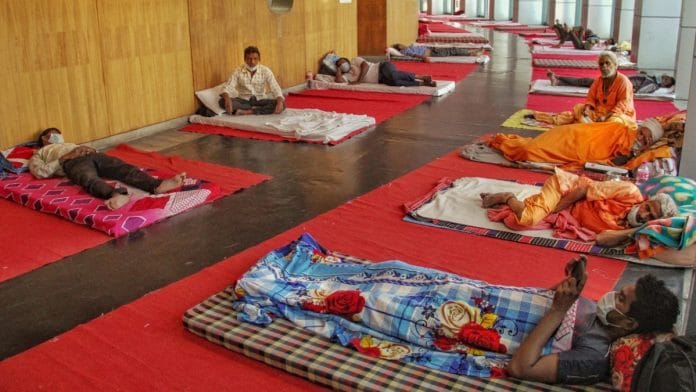New Delhi: The health ministry has asked facilities such as NIMHANS and CIP-Ranchi and state governments to provide mental health support for the thousands of migrant labourers currently housed in relief camps and shelter homes across India.
In a letter dated 3 April, Vandana Gurnani, additional secretary and director, National Health Mission, told states they could use the Centres of Excellence supported under the National Mental Health Programme, and other state government mental health institutions for providing counselling and other support.
She also said institutions such as the National Institution of Mental Health and Neuro Sciences (NIMHANS) in Bengaluru, the Central Institute of Psychiatry (CIP) in Ranchi, and the Lokopriya Gopinath Bordoloi Regional Institute of Mental Health in Assam’s Tezpur could be roped in for providing services.
“Central mental health institutions have been separately requested to coordinate and assist state governments in providing counselling services,” the letter said.
The ministry also issued guidelines on dealing with psychological issues of migrant workers.
India saw a mass movement of workers and daily wage earners from cities back to their villages in the last 10 days after the lockdown shut industries and forced hundreds out of work.
The country, like most of the world, is currently dealing with a sharp rise in coronavirus infections as the disease continues to spread quickly. There are currently over 4,000 reported cases in India, of which more than 100 have died and 318 have recovered.
As reports emerged about the living conditions of such labourers, as well as the risk to their livelihood, the government faced criticism for the situation, which also saw the migrants packed into buses and walking in groups to reach their villages.

Subsequently, the Ministry of Home Affairs on 29 March directed states to ensure there was no movement of people across cities or on highways, sought the sealing of borders, and ordered a minimum 14-day quarantine for those violating the lockdown.
This resulted in workers, who didn’t manage to reach their hometowns, being housed in shelter homes and relief camps.
Also read: Seal borders, put lockdown violators in 14-day quarantine, Modi govt tells states
Measures to mental health
States may also seek support from the National Health mission and National AIDS Control Organisation, Gurnani’s letter stated. All states will have to provide a compliance report to the Centre on the action taken.
The letter also cited an 1 April Supreme Court order on the redressal of grievances of migrant workers, which directed trained counsellors and community group leaders of all faiths to visit relief camps/shelter homes and counsel migrants.
A compliance report on the implementation of the court’s order must also be filed.
Additionally, teams of professionals available under the District Mental Health Programme can be called upon to provide counselling services. The ministry shared a list of clinical psychologists and counsellors registered to the Indian Association of Clinical Psychologists who have volunteered to provide counselling.
Shivani Misri Sadhoo, counsellor and consultant at the Delhi-based Institute of Brain and Spine, welcomed the government’s move and said migrant workers are likely suffering from extreme emotional anxiety, fear and loss of dignity, coupled with the uncertainty over food, medical care and shelter.
“It is important to listen to these people with empathy, compassion and patience to understand their individual problems, provide counselling to address their mental and emotional trauma … And most importantly, to educate them about Covid-19 threats, to tell them about how they can avail government medical facilities, access to food and shelter that are arranged by state and central government,” Sadhoo told ThePrint.
Also read: Over 60% migrants don’t know govt measures in place for them to deal with lockdown: Survey







NIMHANS failed to provide appropriate treatment to common patients during normal time …One can refer my complainant & RTI to NIMHANS Director & Ministry of Health…Then how can NIMHANS appropriately helpful in such crisis periods …These are tall Talks only…